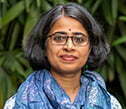Aruna Bhattacharya is a medical anthropologist working in the domain of health systems research and public health. She uses an anthropological lens to study how power, hierarchy and social inequities create marginalisation and affects access to public goods. She is Lead, Academics & Research, at IIHS in Bengaluru, and is currently engaged with the IIHS School of Human Development building up the domain of urban health.
Aruna’s current research focuses on ‘Imagination of Inclusive Health Systems in the Urban’. Her previous research has focused on drug-resistant tuberculosis in the slums of New Delhi and Mumbai; harm reduction programmes for injecting drug users as well as non-injecting sexual partners for the prevention of transmission of HIV and STIs; child protection interventions in constructions sites and railways stations; access to nutrition programmes among particularly vulnerable tribal groups; sexual and reproductive health rights for female sex workers. In recent times, she has conducted an ethnographic study of COVID-19 health seeking behaviour in urban and peri-urban Bengaluru.
She has worked with DANIDA, the World Bank, Population Council, and has led national and international research collaborations. She was an Associate Professor at the Indian Institute of Public Health – Delhi (IIPH-D) at the Public Health Foundation of India (PHFI), and has taught public health courses (PGDPHM and MPH) from an interdisciplinary context. At IIPH-D, she led many research projects as Principal Investigator (PI) and Co-Principal Investigator (Co-PI) with national and international funding. She has also collaborated with the Harvard School of Public Health, University College London and the University of Sydney for research, interventions and for developing a collaborative curriculum on public health. Before joining IIHS, she was a faculty member in the School of Development, Azim Premji University, in Bengaluru.
She has written (and edited) a book, Innovations in Family Planning: Case Studies from India, published by SAGE India in 2015. Currently, she is working on a book on using case studies to create pedagogy in public health using a social science lens. This work initially received funding from Health Systems Global (SHAPES grant).
At IIHS, she is currently working on a large collaborative research project on urban health and climate change. She teaches ‘Social determinants of health and social inequity’ and ‘Urban health’ in the IIHS Urban Fellows Programme. She designed and taught the IIHS Urban Practitioners’ Programme course, ‘Introduction to Health Systems’ in 2023 and Health Systems and Urban India in 2024.







